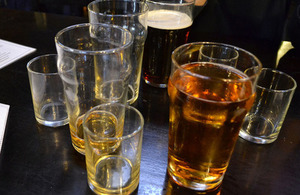New alcohol guidelines show increased risk of cancer
Updated alcohol consumption guidelines give new advice on limits for men and pregnant women.

New guidelines for alcohol consumption, produced by the UK Chief Medical Officers, warn that drinking any level of alcohol increases the risk of a range of cancers. This is supported by a new review from the Committee on Carcinogenicity (CoC) on alcohol and cancer risk .
It is now known that the risks start from any level of regular drinking and increase with the amount being drunk, and the new guidelines are aimed at keeping the risk of mortality from cancers or other diseases low. The links between alcohol and cancer were not fully understood in the original guidelines, which came out in 1995.
This review also found that the benefits of alcohol for heart health only apply for women aged 55 and over. The greatest benefit is seen when these women limit their intake to around 5 units a week, the equivalent of around 2 standard glasses of wine. The group concluded that there is no justification for drinking for health reasons.
These issues prompted changes to alcohol guidelines for men. Men should not drink more than 14 units of alcohol each week, the same level as for women. This equals 6 pints of average strength beer a week, which would mean a low risk of illnesses such as liver disease or cancer. The previous guidelines were 21 units for men and 14 units for women per week.
An additional recommendation is not to ‘save up’ the 14 units for 1 or 2 days, but to spread them over 3 or more days. People who have 1 or 2 heavy drinking sessions each week increase the risk of death from long term illnesses, accidents and injuries. A good way to reduce alcohol intake is to have several alcohol free days a week.
The guidelines for pregnant women have also been updated to clarify that no level of alcohol is safe to drink in pregnancy. The previous advice for pregnant women to limit themselves to no more than 1 to 2 units of alcohol once or twice per week has been removed to provide greater clarity as a precaution.
Dame Sally Davies, Chief Medical Officer for England, said:
Drinking any level of alcohol regularly carries a health risk for anyone, but if men and women limit their intake to no more than 14 units a week it keeps the risk of illness like cancer and liver disease low.
I want pregnant women to be very clear that they should avoid alcohol as a precaution. Although the risk of harm to the baby is low if they have drunk small amounts of alcohol before becoming aware of the pregnancy, there is no ‘safe’ level of alcohol to drink when you are pregnant.
What we are aiming to do with these guidelines is give the public the latest and most up to date scientific information so that they can make informed decisions about their own drinking and the level of risk they are prepared to take.
Advice on single episodes of drinking is included in the guidelines for the first time. To keep the short term health risks low:
- limit the total amount of alcohol drunk on any one occasion
- drink more slowly, with food and alternate with water
Guidance about a set number of units for a single occasion or day was considered. However, partly because the short term risks for individuals vary so widely, this is not currently included in the guidelines. Whether the new guidelines should include a specific number of units, as a simple number can be easier to follow than more general advice, is included in the consultation.
This new advice follows a detailed review of the scientific evidence used for the guidelines in 1995. This work has been underway since 2013, led by a panel of experts in public health, behavioural science and alcohol studies.
The development of the new guidelines was chaired by Professor Mark Petticrew, Professor of Public Health Evaluation at the London School of Hygiene and Tropical Medicine and by Professor Sally Macintyre, Professor Emeritus at the University of Glasgow
Professor Petticrew, said:
This new guidance has been based on a wide range of new evidence from this country and overseas. We have reviewed all the evidence thoroughly and our guidance is firmly based on the science, but we also considered what is likely to be acceptable as a low risk level of drinking and the need to have a clear message.
The CoC’s latest findings support the significant links from alcohol to cancer outlined in the new guidance.
The CoC review found that drinking even a small amount of alcohol increases the risk of some cancers compared with people who do not drink at all. The risk of getting some alcohol related cancers gradually reduces over time when people stop drinking, but can take many years before the risk falls to the levels found in people who have never drunk alcohol.